“Help yourself — and thousands around you will be saved”: Kayak solidarity rally for jailed Belarusian journalists held near Vilnius
While the sun finally broke through weeks of rain over Vilnius on June 28, a group of Belarusians gathered on Lithuania’s Merkys River for an unusual but meaningful event — a solidarity kayak rally to support imprisoned journalists and political prisoners in Belarus.
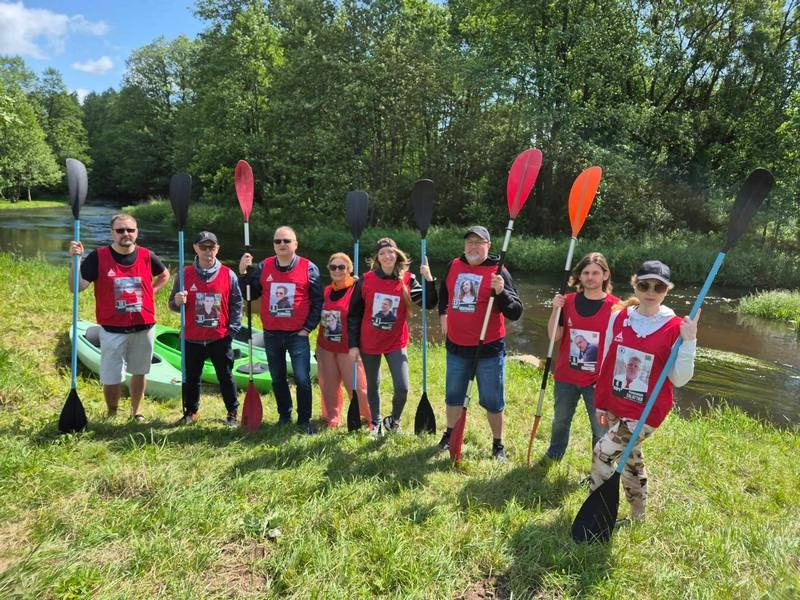
Solidarity kayak trip. June 28, 2025. Photo: BAJ
The event, organized by the Belarusian Association of Journalists (BAJ), marked part of the MediaWave campaign, a series of initiatives leading up to BAJ’s 30th anniversary this fall. With 38 Belarusian journalists currently behind bars and over 300 political prisoners recently released, participants emphasized that every action — no matter how symbolic — contributes to keeping attention on those unjustly imprisoned.
Previously, BAJ had already hosted several solidarity quizzes and a bike ride through Vilnius. The next stop in this series of events is the themed MediaCamp “Offscreen,” which will take place on July 19–20 at a cozy countryside estate near Kaunas.
“We are witnessing a wave of releases: over 300 people have walked free from Belarusian prisons. Every act of support matters — for political prisoners, for journalists — it all adds up to pressure for change,” said lawyer Aleh Matskevich, echoing the sentiment shared by all who took part in the river rally.
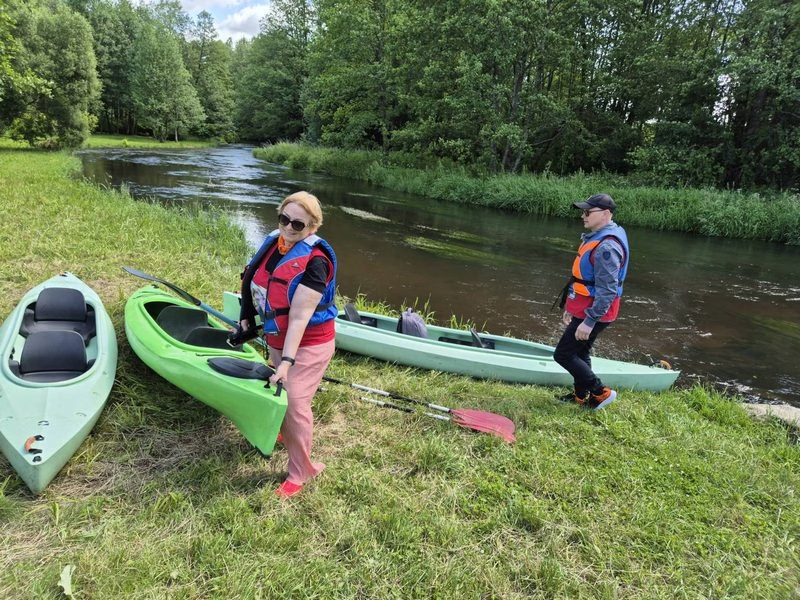
Solidarity kayak trip. June 28, 2025. Photo: BAJ
“We’re trying to draw attention to the 38 journalists who are imprisoned”
After weeks of rain in Vilnius, June 28 finally brought a break: it turned out to be a sunny, albeit windy day. It was on this Saturday that the latest “MediaWave” event — a kayak trip on Lithuania’s Merkys river — took place.
BAJ has faced criticism from fellow media workers who consider such solidarity actions pointless, claiming they “don’t bring journalists’ release any closer.” The debates over the forms and methods of supporting political prisoners were addressed by BAJ’s Deputy Chair and Head of the Legal Center, Aleh Ahejeu.
“Our actions aim to broaden the circle of people who know about Belarusian political prisoners. We try to convince them that their release is urgently needed. This is achieved both offline and online. When we organize an offline event, we count on people seeing it live. Plus, these events are recorded and spread online afterwards.
That’s exactly our goal. And the fact that there’s now a public discussion about ways to free political prisoners means that both the bike ride and the kayak trip have fulfilled their purpose. We’ve organized and will continue to organize solidarity actions.”
“As for the critical voices saying solidarity actions don’t help… Of course, political prisoners are essentially hostages of Lukashenka. To free them, pressure needs to be applied to the regime — it won’t release anyone voluntarily,” Ahejeu said. “That means pressure is needed from all sides: through public opinion, through foreign politicians, through unrest and tension even inside Lukashenka’s system. Everyone wants to look good. And when the whole world sees the Belarusian regime as a criminal holding hostages, that image pushes the regime itself toward releasing political prisoners.”
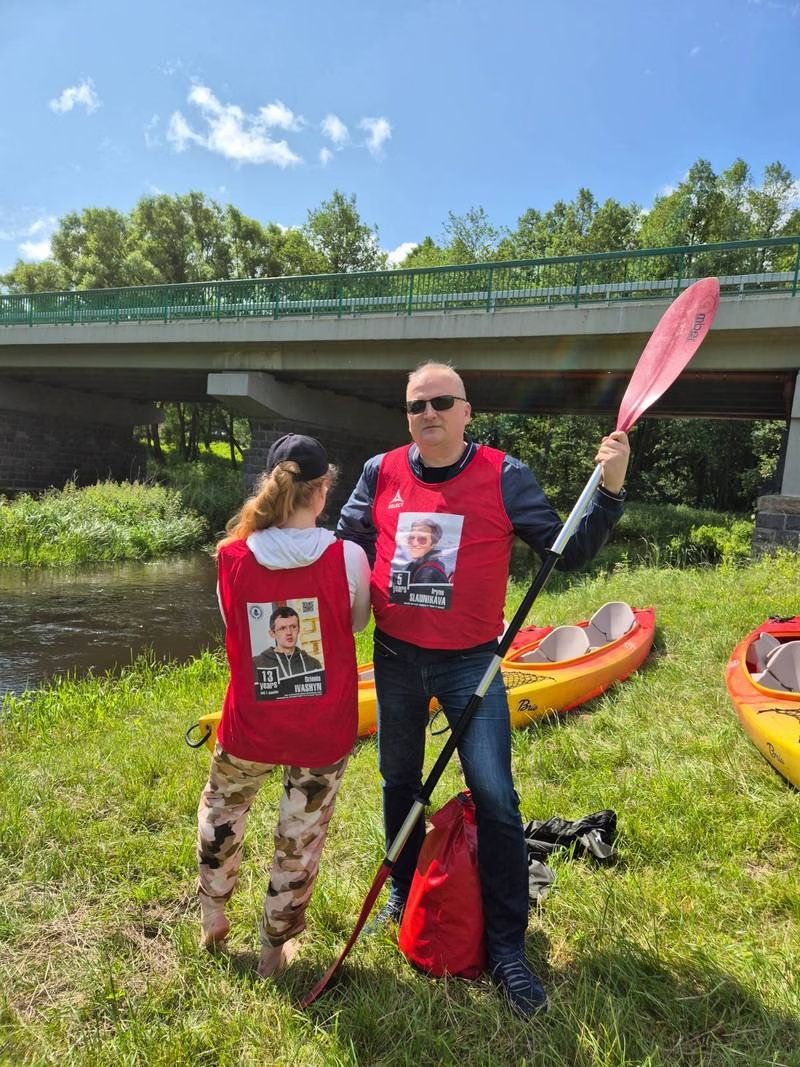
Head of BAJ’s Legal Center Aleh Ahejeu with participants of the kayak trip. Photo: BAJ
Journalist Iryna Novik explained her motivation to take part:
“Events like this allow us not only to survive, but to feel like we’re living a normal life, to get inspired, to find new motivation to live and do something. Because if you only grieve, cry, and dwell on the bad, and do nothing, you’ll have no strength left — not to help political prisoners, not even to pull yourself out of deep depression.
There’s no need to reinvent the wheel. We should remember the old truth: help yourself — and thousands around you will be saved. I believe that even if what we do may seem like entertainment to some, but it gives us strength — that means we’re also gaining the potential to help political prisoners. And not only them.”
“Solidarity actions are very important: they make us visible. If we can support prisoners this way — why not?” believes Hrodna.life staff member Volha Novik.
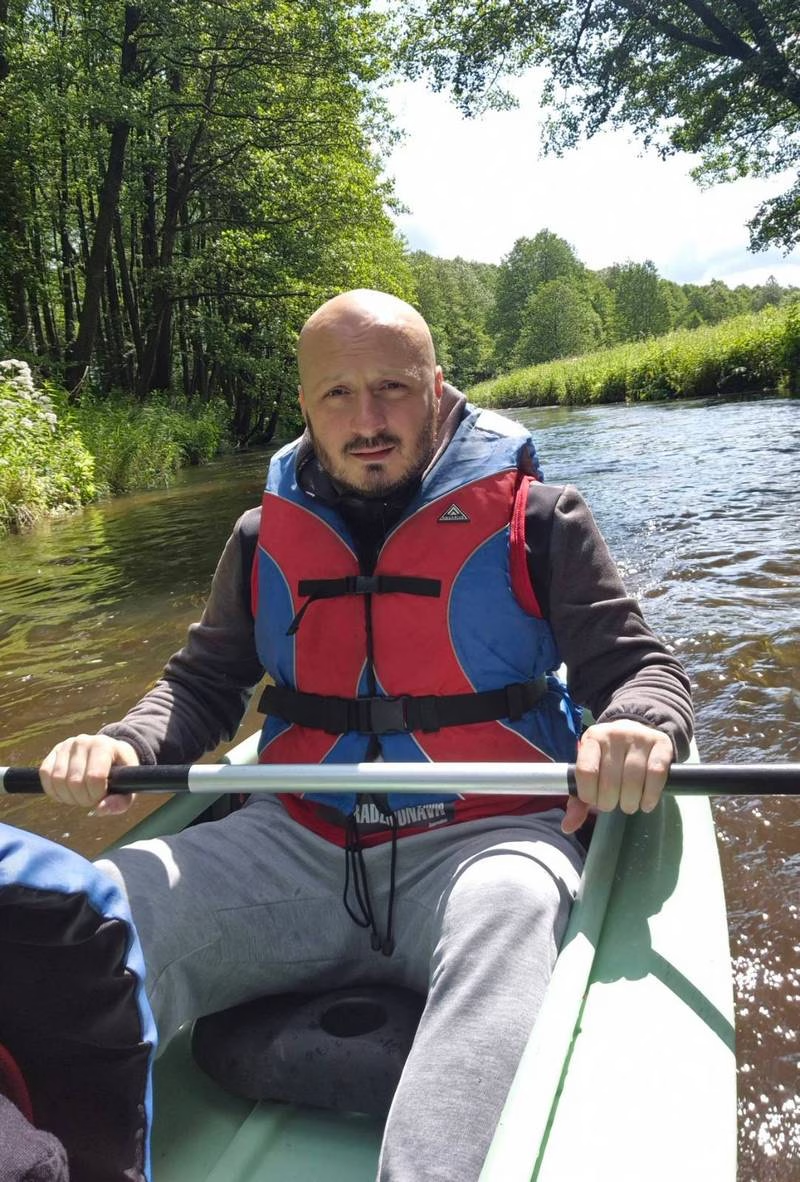
Ukrainian journalist Vlad Sydorenko also joined the solidarity action. Photo: BAJ
Human rights defender Leanid Sudalenka reminded that he has been part of BAJ for 25 years:
“For me, BAJ is a values-driven organization that primarily defends freedom of speech in Belarus. In September, BAJ will celebrate its 30th anniversary. And all these decades, as a regional lawyer, I’ve been helping defend freedom of speech.
Through the kayak trip, we’re also trying to draw attention to our 38 journalist colleagues who are behind bars. In my opinion, any activity that highlights the issue of political prisoners — be it a bike ride, a kayak trip, or anything else — is valuable.”
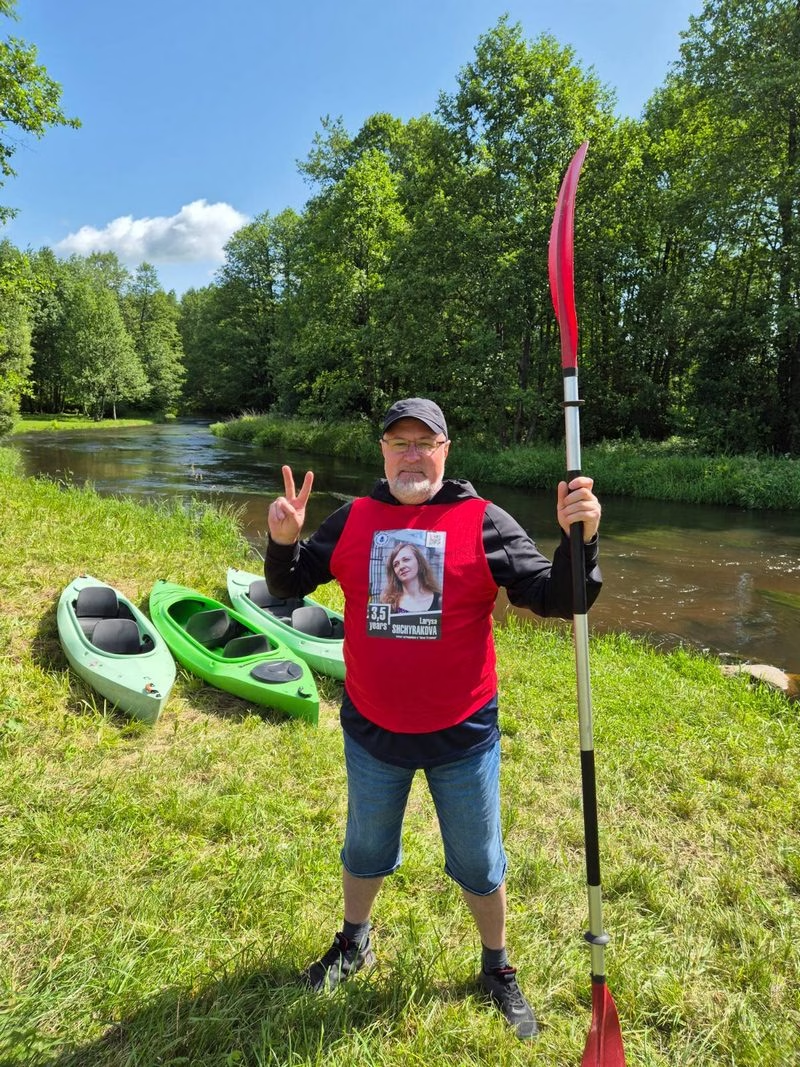
Leanid Sudalenka on the Merkys river. Photo: BAJ
“And to those critics lying on their couches saying we shouldn’t do anything — greetings, first of all, and second — join us, it’s not too late,” adds Leanid.
A reminder of the repression against free speech
During the trip, participants organized an additional symbolic action: they set paper boats afloat on the river with the names of imprisoned media workers.
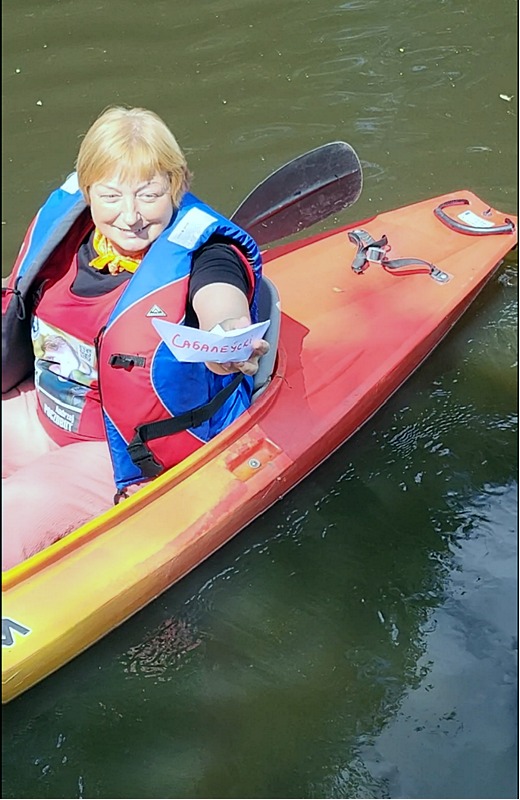
Video screenshot
This was a peaceful, symbolic act of solidarity and a reminder of the repression against free speech in Belarus. Each paper boat served as a reminder that behind bars are real people — colleagues, friends, professionals.
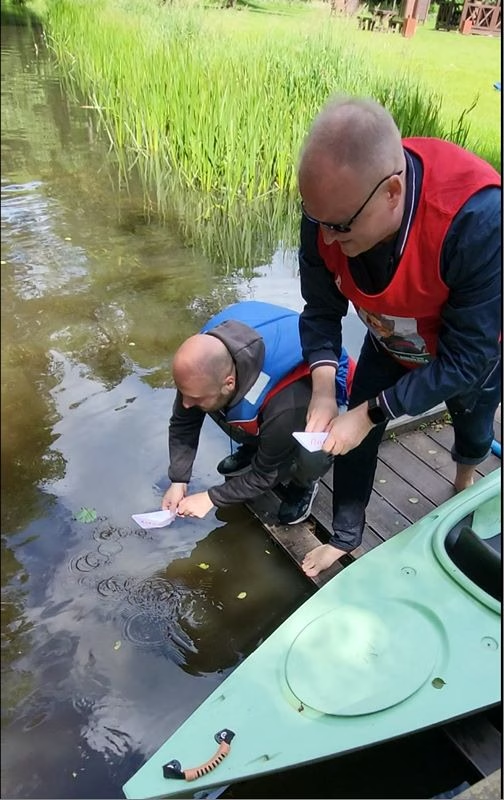
Video screenshot
The paper boats with names are a way to make sure we don’t forget those unjustly imprisoned. By setting them afloat, participants wanted to send a message: freedom is possible, we believe in the release of those behind bars.
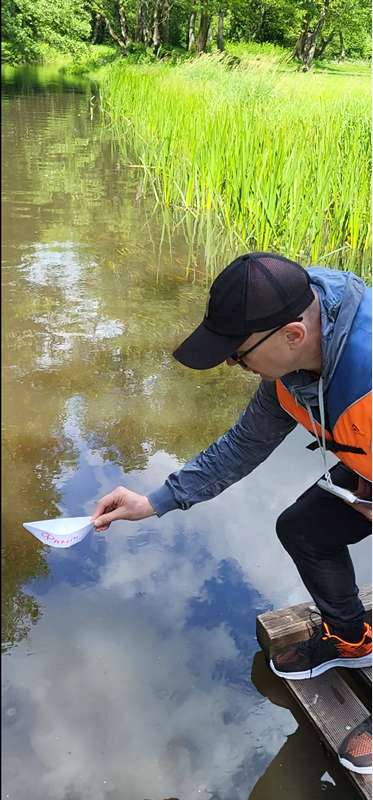
Video screenshot
Such actions often take place outside Belarus — in Vilnius, Warsaw, Berlin, and other cities. By organizing them, BAJ emphasizes: the fate of Belarusian journalists is not a domestic issue — it’s a matter of universal human rights.
Of course, paper boats won’t reach Belarus, they won’t storm Belarusian prisons or carry away the captive journalists. But what matters is that we remember our imprisoned colleagues — because any one of us could be in their place.
 @bajmedia
@bajmedia
